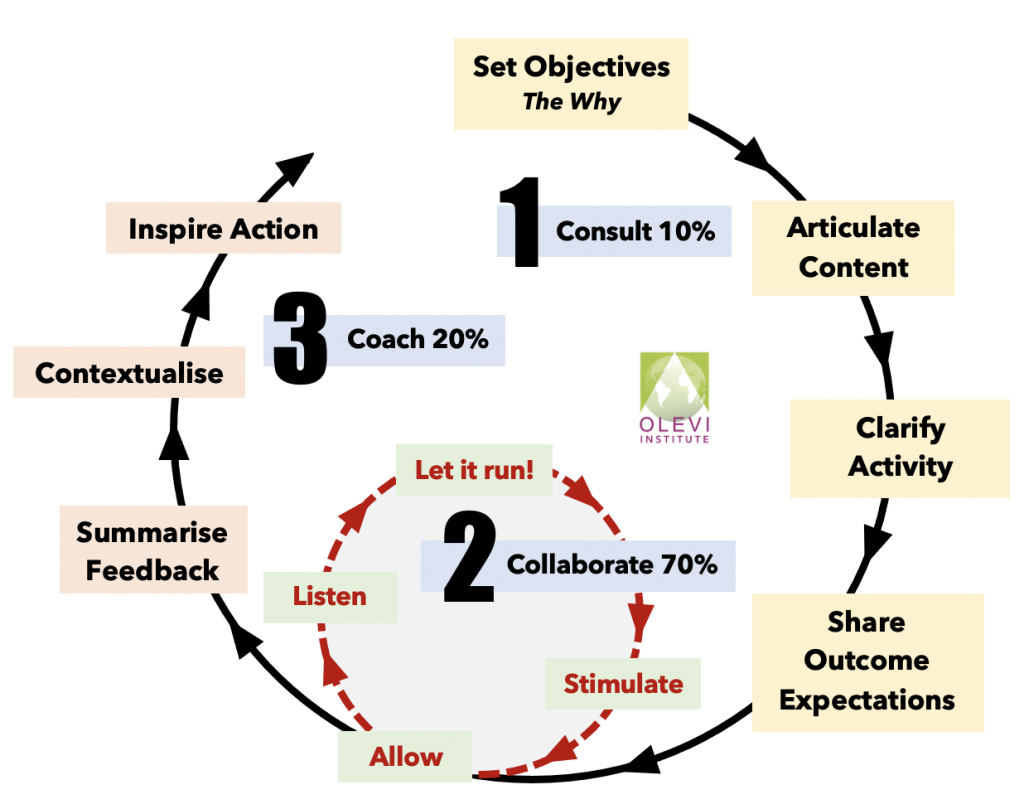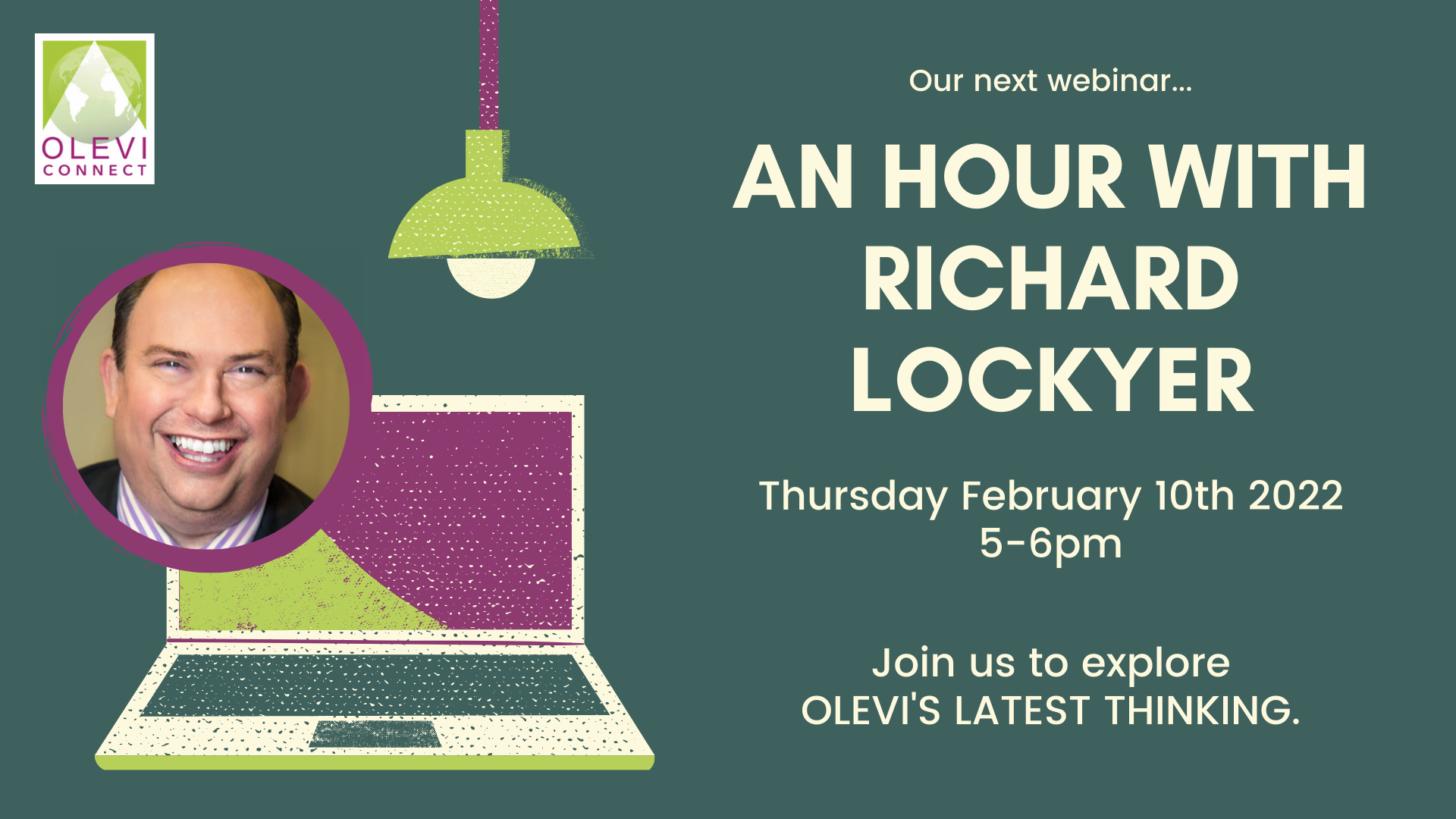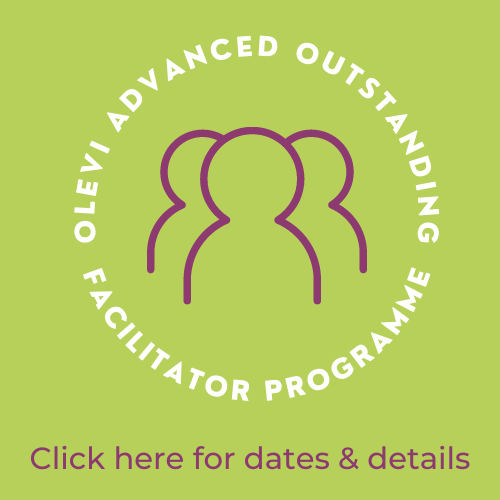Think Pieces
The OLEVI Facilitation Model – The Facilitator as a Credible Consultant (Part 2)

Part Two
The OLEVI Facilitation Model
The Importance of Facilitators in Schools.
We have already explored the Consult phase of the Model, emphasising the importance of Facilitators being, and being seen to be credible consultants by those they work with. This is not so they can lecture or dictate how professionals might use this expertise or experience. Instead, they use it to:
1 Generate a sense of expectation
2 Offer expert instruction
This is not easy, especially, when Facilitators have only 10% of the time to fulfill this role.
The main focus of this Think Piece is to explain the purpose and components of the Collaborate and Coach phases of the model, and explore how they might be implemented effectively to maximise learning and impact that sticks!

COLLABORATE
(promote collaborative discovery and connected communities) 70%
How do you use expertise to empower others to think and grow?

What are the rules for effective collaboration?
At its heart, Facilitation is the craft of managing, leading and maximising the impact of these discussions on professional learning and student outcomes. Time after time, the research reminds us that the quality of teacher collaboration positively impacts teacher performance and student achievement.
For example, the study by Ronfield and McQueen (2015), states “Student achievement gains are greater in schools with stronger collaborative environments and in classrooms of teachers who are stronger collaborators.” This is the reason why OLEVI dedicate 70% of any professional learning time to the Collaborate stage so participants are thinking and learning together.
Indeed, it is the most important phase in the OLEVI Facilitation Model despite it looking the smallest in the diagram.
The key to the quality of collaboration is professionals talking together with clear purpose (as a result of a quality Consult phase) leading to inspired action that is designed to impact on their context (as a result of a quality Coaching phase).
The Collaborate phase has two distinct intended outcomes, linked to the OLEVI Approach:
- Connecting communities: By establishing a shared language and common ethos, we galvanise participants to harness its collective wisdom and raise aspirations. With this, teachers, leaders and colleagues, will be aligned in their values, as well as being ready, willing and able to challenge and support others in their growth.
- Collaborative discovery: By ensuring meaningful relationships and purposeful interactions, we enable complex ideas and issues to be explored; productive actions to be generated; and tailored support to be provided.
This requires open and honest discussions, whereby everyone shares their experience and expertise to the benefit of the group. Everyone is responsible for the supporting the thinking and challenging the expectations of others. For example, a group of teachers from different curriculum areas, phases, and school type, might unpick and explore a concept like ‘high-quality feedback’ so they broaden and deepen their collective understanding of it.
There are four key components to the role of Collaborator – Allow; Listen; Let it run; and Stimulate. These are explained in further detail below:

After a well articulated stimulus and clear activity is explained, trust your participants or team to work through it. This will require rigorous discussion, debate, research, problem solving, questioning, reflection and most importantly, thinking. In other words: do not interfere, even if they appear to be ‘in the pit’. Give them the space to challenge themselves and discover their new learning!
For example, during the ‘create a T&L model’ task, Outstanding Teacher Programme (OTP) delegates often have loads of questions… Is this for a lesson or a whole curriculum… is it for an ECT or a system leader?

Facilitators must be global listeners. This means they suspend judgement and are fully ‘present’ with their participants or team members so they understand their experiences or points of view. This means listening for more than their words but instead taps into:
– The deeper meaning.
– Unspoken words.
– Non verbal signals and signs.
– Feelings conveyed.
This Listening for Learning provides a deeper understanding of the true, current reality. It avoids assumptions being made too quickly and wrong conclusions being drawn. It will put you in a better place to respond effectively later, if necessary.

It might be tempting to join the conversation; share your thoughts or opinions; or solve problems utilising your expertise or experience. However, if a Facilitator shares their opinions, this could cut the discussion short.
Great Facilitators must remember they are considered credible experts: by sharing a point of view, this could be easily adopted by the group as the ‘right answer’ or ‘only way forward’. This could immediately reduce creativity, confidence and the sense of ownership going forward amongst the participants or team. Letting the discussion run as long as you can demonstrates trust and creates a culture of high challenge and engagement.

There are certain circumstances when a Facilitator might intervene. For example:
1 If the conversation is ‘drying up’, you might layer information and activity to add challenge and keep the thinking moving forward.
2 If the conversation is losing focus, you might refocus the group by restating the task set or stimulus explained. For example, reminding groups they should be ‘predicting’ not ‘describing’ (see below for more information on this).
3 If the conversation is at a high level, carefully praise the skills and mechanisms being employed by participants so they are more widely adopted by the group.
The key message is facilitators must avoid overstimulating and directing people. If the conversation is stimulating already, be confident enough to not say anything. If you do stimulate, move on very quickly: do not get immersed in the conversation! Participants are not there to ‘impress you’ instead they are to ‘connect’ and ‘discover’ with one another.

COACHING
(prompt personal accountability and action) 20%
Is there commitment and resilience to achieve amongst those you work with?
Lastly, Facilitators have a role as the Coach. In this 20%, they will summarise the empowered thinking of the group and ensure every single person and place uses this to generate productive action plans, suitable for their context, and the commitment and resilience to achieve them. This signals a shift in mindset as well as an improvement in knowledge and skills: the cornerstone of long term, continual improvement!!

Facilitators should employ a variety of ways to ensure delegates feed back key thinking and learning from their discussions.
- Summarise learning: they will sum up not only a person’s thinking but also draw connections between groups. This ‘play back’ can often hold a mirror up to colleagues ideas, assumptions and beliefs so they can be better challenged or accepted by others.
- Challenge current thinking: facilitators should push and challenge people to think deeply and articulate their thoughts more clearly. They will also help professionals get to ‘the essence’ of what is being ‘discovered’. A common question a Facilitator asks is ‘So what is important about what you are telling me?’.
- Shift from description to prediction: Some individuals and groups will simply want to narrate or describe what they do now. This is great for sharing best practice or creating opportunities to celebrate successes. However, this does not move people or places forward. Instead, they keep doing what they have always done. OLEVI believes conversations should be more forward looking or steeped in ‘prediction’. Indeed, facilitators will be pushing divergent thinking and innovative action: “What could be done differently and why?”
Facilitators should always be looking for who has spoken and who has not.
- They should be thinking of ways to draw those who have not spoken into the conversation so they add value to the wider discussion. For example, ‘bouncing around the room’, asking for their views on what is being said: ‘Have you got anything to add?’. This will add a sense of personal accountability to everyone.
- They should be considering what the impact is of some people dominating the conversation or moving it ‘off task’ and how they can reduce their input. This global awareness is important: there might be someone willing to challenge and move the learning forward in the right direction.

At this point, much of the conversations might be about what we do currently and what could be achieved in a more general sense. This stage brings relevance. Before people and places consider their way forward, they need to think and consider about how it will affect their situation.
– What am I trying to achieve and where am I now?
– How do I move my context forward?
Indeed, by this point, participants and organisations have amassed a compelling rationale for saying ‘we have to do it’. Thus the conversation is about how, rather than if, we should act and change. We should be re-contextualising our thinking, focused on forward thinking questions such as ‘How can I apply this strategy most effectively with my Year 9s?’.

At the end of this phase, professionals, pupils and places need to be deciding what action or actions to ensure individual and organisation goals are achieved. These can be, for some classroom teachers, incremental changes to how they implement a specific area of pedagogy, for leaders, wholesale transformation of a trust wide approach to quality assurance. Big or small, those involved, should feel clear, confident and driven to achieve it. A word of warning for facilitators: 1-2 carefully crafted actions are far better than a long ‘to do’ list or fancy strategic plan, however, excited people are to ‘get on with it’. Ensuring these actions are SMART is crucial so they can be accountable for them.
CLOSING REMARKS & QUESTIONS
Over the past 20 years, it has become evident great facilitators create high performing people – by harnessing professional learning opportunities – and lead the transformation of practice, approach and culture, so practitioners, pupils and places continually thrive and succeed.
– Is there a critical mass of teachers, leaders and colleagues that are facilitators?
– Are you deepening and developing their knowledge, skills and behaviours?
– Are they supported with the right systems and processes?
– Are they valued and empowered to drive improvements in practice, approach and culture?
– What is your next step?


